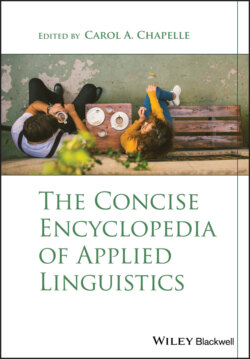Читать книгу The Concise Encyclopedia of Applied Linguistics - Carol A. Chapelle - Страница 159
Use
ОглавлениеUse refers to the ability of learners to draw on their vocabulary resources in undertaking speaking or writing tasks, like giving a talk, participating in a conversation or discussion, composing a letter, writing an essay, or compiling a report. This represents a more genuine sense of production than a recall task such as supplying a content word to complete a gap in a sentence. One characteristic of vocabulary use tasks which distinguishes them from the other three approaches outlined above is that the task designer cannot normally target particular lexical items by requiring the learners to incorporate specific words into what they produce. Thus, the choice of words can only be influenced indirectly by the choice of task and topic, or by the selection of appropriate input material: source texts, pictures, diagrams, and so on.
As with comprehension tasks, use tasks can be assessed purely as measures of the learners' vocabulary ability or as measures of a larger speaking or writing construct in which vocabulary is embedded as one component. Vocabulary researchers have devised a variety of statistics to evaluate the lexical characteristics of texts: How many different words are used? What percentage of the words are low‐frequency items? What percentage are content words? Until now, the statistics have not been very practical tools for assessment purposes but recent advances in automated writing assessment (Carr, 2014), in which lexical measures play a prominent role, mean that automated ratings complement human judgments in the assessment of writing in the Internet‐based Test of English as a Foreign Language (TOEFL), and they completely replace human raters in the Pearson Test of English (Academic).
For now the more common practice in speaking and writing tasks is for the teacher, or the rater in the case of a more formal test, to assess the learners' use of vocabulary by means of a rating scale. For example, in the speaking module of the International English Language Testing System (IELTS), lexical resource is one of four criteria that the examiners apply to each candidate's performance, along with fluency and coherence, grammatical range and accuracy, and pronunciation. Highly proficient candidates are expected to use a wide range of vocabulary accurately and idiomatically, whereas those with more limited speaking proficiency are restricted to talking about familiar topics and lack the ability to paraphrase what they want to say. Thus, such assessments are based on raters' perceptions of general lexical features of the test takers' task performance, rather than on any individual vocabulary items.
